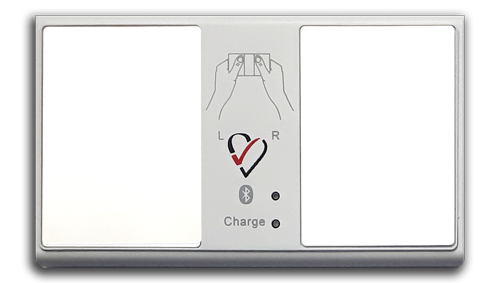Learn More About Electrocardiograms (EKG/ECG):
Telemetry and Telemedicine
10 Ways Mobile ECGs Contribute to Telemedicine

Are you interested in receiving accurate electrocardiogram (‘ECG’ or ‘EKG’) readings in as few as 30 seconds that can then be sent instantly to a physician for review?
This website offers general ECG information for educational purposes only. We are not licensed medical professionals. Content should not be construed as a substitute for professional medical advice, diagnosis, or treatment. For personalized guidance, consult a qualified healthcare provider.
10 Ways Mobile ECG Devices Contribute to Telemedicine
Remote Monitoring
Patients can use mobile ECG devices to record their heart’s electrical activity at home or in real-time.
The data collected through this telemetry can be transmitted securely to healthcare providers, allowing continuous monitoring without the need for regular in-person visits.
Early Detection of Cardiac Issues
Mobile ECG devices enable early detection of abnormal heart rhythms or cardiac events.
Healthcare providers can receive telemetry alerts in case of irregularities, allowing for timely intervention and prevention of serious complications.
Chronic Disease Management
Patients with chronic cardiovascular conditions, such as atrial fibrillation or arrhythmias, can benefit from continuous monitoring using mobile ECG devices.
Healthcare providers can remotely manage and adjust treatment plans based on real-time data, improving overall disease management.
Postoperative Monitoring
Mobile ECG devices are valuable for monitoring patients after cardiac surgeries or procedures.
This allows healthcare professionals to closely observe the patient’s recovery remotely and intervene if any complications arise.
Reduced Healthcare Costs
Telemedicine, enabled by mobile ECG devices, can reduce the need for frequent hospital visits and admissions.
Remote monitoring and telemetry can lead to cost savings for both patients and healthcare systems.
Increased Patient Engagement
Patients become more actively involved in their healthcare when they can monitor their cardiac health at home.
Mobile ECG devices empower patients to take control of their well-being and make lifestyle adjustments based on real-time data.
Geographical Accessibility
Telemedicine, facilitated by mobile ECG devices, improves access to specialized cardiac care for individuals in remote or underserved areas.
Patients can receive expert consultation without the need to travel long distances.
Enhanced Data Sharing and Collaboration
Mobile ECG devices enable the seamless sharing of data between patients, primary care physicians, and specialists.
This fosters collaborative care, allowing different healthcare providers to work together in managing a patient’s cardiac health.
Integration with Electronic Health Records (EHR)
Data collected by mobile ECG devices can be integrated into electronic health records, providing a comprehensive view of a patient’s cardiac history for healthcare professionals.
Teleconsultations and Teleinterpretation
Healthcare providers can conduct virtual consultations with patients based on the ECG data transmitted remotely through telemetry.
Specialists can remotely interpret ECG results, providing timely feedback and recommendations.
Mobile ECG devices enhance the capabilities of telemedicine by enabling remote monitoring, telemetry, early detection, and improved management of cardiac conditions, ultimately leading to better patient outcomes and increased accessibility to cardiac care.
Learn All About EKGs
Use these pages to get up to speed on the history of electrocardiograms, their purpose, and the future of telemedicine.
About EKGs
An electrocardiogram (ECG or EKG) is a non-invasive medical test that’s crucial in the field of cardiology for assessing the electrical activity of the heart. EKGs are an essential tool for diagnosing and monitoring various heart conditions, and its history, principles, and applications are subjects of great significance in the medical world.
Abnormal EKGs
An abnormal EKG (electrocardiogram), also known as an ECG, refers to a recording of the heart's electrical activity that deviates from the expected or typical patterns. EKGs are used to assess the heart's rhythm and detect various cardiac conditions. Abnormalities on an EKG can indicate a range of heart-related problems, and the specific abnormalities may vary.
EKG Tests
Electrocardiogram (ECG or EKG) tests come in various forms, each serving a specific purpose in assessing the electrical activity of the heart. These tests are important for diagnosing various heart conditions and evaluating the overall health of the cardiovascular system. With recent advancements, ECG Tests can now be performed at home or a hospital.
Heart Rate Monitors
The basic components of a heart monitor include electrodes, which are placed on the skin to detect electrical signals generated by the heart, and a recording or monitoring unit that processes and displays the data. The recorded information helps healthcare providers assess the heart’s health, diagnose conditions, and tailor treatment plans accordingly.
Telemedicine
Mobile ECG devices play a pivotal role in telemetry and burgeoning field of telemedicine. These devices allow patients to record medical-grade EKGs at home and then send to a doctor for physician review. This convenience saves time, costs and can mean the difference in detecting and treating cardiac conditions that require immediate attention.
HeartCheck Products
Receive accurate electrocardiogram (‘ECG’ or ‘EKG’) readings in as few as 30 seconds that can then be sent instantly to a physician for review. Health Canada and FDA cleared, the HeartCheck™ CardiBeat ECG monitor is a medical-grade, handheld device that’s easy to use for consumers and available for purchase over the counter.

